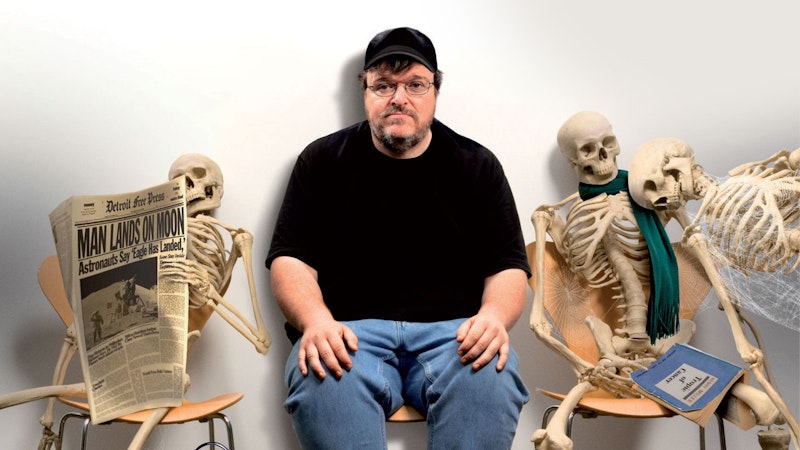2004—the height of Michael Moore’s fame—doesn’t need to be revisited. Unless you weren’t around yet or really tuned out, you know he made a movie called Fahrenheit 9/11 around that time. It was about George W. Bush, his administration, the September 11, 2001 attacks, and the ongoing wars in Iraq and Afghanistan. Like I wrote last week, Moore was already famous by then—I remember seeing a full page ad for Bowling for Columbine in our New York apartment while my dad talked about what an asshole this guy was. Felt fair: smug, as round as the bowling ball he was holding high, Moore rarely responded or corrected his behavior when his hypocrisy, distortions, and manipulations were scrutinized or revealed. Of course I learned all of this a few years later, but that image endures, because Moore can’t help making himself look bad in all of his movies.
Bowling for Columbine makes you think you’re watching a Trey Parker and Matt Stone cartoon 20 minutes after an interview with Stone; Capitalism: A Love Story hardly criticizes Barack Obama for the bailout package he signed; Sicko ends with Moore sending an “anonymous” check for $12,000 to the owner of the most popular anti-Michael Moore site on the internet. In nearly all of his films, he “recruits” people and brings them along on lame, jokey adventures: boating with 9/11 first responders to get free healthcare at Guantanamo Bay, walking into K-Mart headquarters and asking to return bullets lodged in the bodies of Columbine survivors, and hassling Manhattan doormen as he tries to “rob” a bank with a giant burlap sack.
It’s all stupid (bad stupid, not funny), but hardly invalidating as broad editorial critique. Sicko, from 2007, is Moore’s most dated film, despite the fact that the United States still doesn’t have universal healthcare. It was made and released before Obama’s election and the Affordable Care Act, but while much of the two-hour film is dedicated to people being coverage due to “pre-existing conditions,” its trips to Canada, Britain, France, and Cuba remain relevant even if some of their particulars are off. Horror stories about the NHS—like my uncle, who languished in a bed for 10 days with coronavirus in early-2021 before being treated—are out there, but while people in these countries may criticize their healthcare, it’s obvious that no one envies our healthcare.
Sicko was made and released in the mid-2000s, and little has changed. Kickstarter is rarely used to fund films or art projects anymore (Hal Hartley aside), but rather to pay medical bills. People still refuse ambulances and hospital visits to avoid astronomical charges. Half of my friends haven’t been to a dentist or doctor in years. A healthy population would surely make for better worker bees and feed pigs, right? Isn’t it obvious now that the physical, mental, and emotional starvation of millions of Americans will eventually lead to a revolt, or a particularly stupid election? If the God known as “the market” can accept quantitative easing, it can accommodate universal healthcare. Cut the defense budgets for countries like Ukraine and Israel, and whoever else we’re funding—what do I know? I’m just some dumb American like Michael Moore. That’s probably why I think he was one of the most important filmmakers of the 2000s, the only entertainer brave enough not to give in to Bush, in his life or his work.
—Follow Nicky Smith on Twitter: @nickyotissmith

